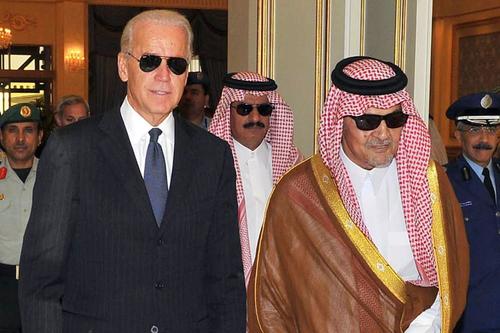Biden Can Trigger A Regional War By Reviving The Nuclear Deal
Authored by Majid Rafizadeh via The Gatestone Institute,
The Biden administration, deep down, unfortunately seems to wish to forge ahead with its agenda to revive the 2015 Joint Comprehensive Plan of Action (JCPOA) — also known as the Iran nuclear deal, which, incidentally, Iran never signed — and subsequently to lift sanctions against Tehran.
The Biden administration also seems to be conflicted about reversing the course of the previous administration’s “maximum pressure” policy of economic sanctions on the Islamic Republic. The US had reportedly authorized South Korea to release $7 billion in frozen assets to Iran, until, on March 10, US Secretary of State Antony Blinken urged South Korea not to release the funds until Iran had agreed to return to full compliance with the JCPOA. Unofficial meetings between the Islamic Republic and the P5+1 (China, Russia, the United States, the United Kingdom and France, plus Germany) seem to be on the way to resurrect the nuclear deal, in spite of major opposition from many regional powers, including Israel and Saudi Arabia, as well as US Senators Jim Risch, Marco Rubio and Jim Inhofe.
Governments in the Middle East have a valid reason to be concerned about the nuclear deal. They have already witnessed its negative consequences. US President Barack Obama had pledged that he was “confident” the deal would “meet the national security needs of the United States and our allies”. Throughout that time, the Obama administration not only initiated and expanded appeasement policies, they made unprecedented concessions in an attempt to dissuade the ruling mullahs from their internal and external aggression. The US met them with generosity and flexibility every step of the way.
Soon after, however, many countries in the region – as well as US citizens — felt betrayed. It became clear that the nuclear deal had entirely overlooked Iran’s funding of its violent proxies, such as Hezbollah, which took over Lebanon, Hamas in the Gaza Strip and the Houthis in Yemen, as well as Iran’s expansion of influence over large swaths of South America. This would have not been the outcome if Israel and other regional powers had been part of the negotiations.
The composition of the current negotiating team, similar to the previous one, completely excludes those on Iran’s doorstep. In an approach reminiscent of the bygone colonial era, it remains a policy set by governments thousands of miles away.
Worse, after the JCPOA agreement was sealed, the regional powers came to witness first-hand the impact of this nuclear deal. As sanctions against Iran were lifted during the Obama administration, it quickly became clear that instead of curbing Iran’s malign behavior at home and abroad, those actions had, in the eyes of the international community, given Iran a newfound global legitimacy. Both that, and the lifting of sanctions, generated billions of dollars in revenue for Iran’s military institution, the Islamic Revolutionary Guard Corps, as well as for Iran’s militia and terror groups. Tehran used that influx of revenues to expand its influence throughout the region, including in Syria, Iraq, Yemen and Lebanon. Iran’s expansion campaign proved immensely successful.
The Gulf states and Israel saw immediately that the threat Iran poses was never, and will not be, thwarted by this nuclear deal. Instead of preventing Iran from having nuclear weapons, as deceitfully promised, the deal actually permitted Iran in a short time to enrich as much uranium and manufacture as many nuclear bombs as it liked – as well as the ballistic missiles with which to deliver them.
Arab nations have already seen the consequences of the previous attempt at striking a nuclear deal. The Iranian-armed Houthis simply ratcheted up efforts to cause death and destruction in Yemen, and Hezbollah escalated its involvement and control of large swathes of Syrian territory. The region also saw a greater propensity for Houthi rocket launches at civilian targets in Saudi Arabia, the deployment of thousands of Hezbollah foot soldiers in Syria, and the constant bombardment of southern Israel by Iranian-funded Hamas rockets.
As Israeli Prime Minister Benjamin Netanyahu pointed out, “We have already seen the nature of agreements with extremist regimes like yours [the Iranian regime]”. Saudi Foreign Minister Prince Faisal bin Farhan chimed in to the Agence France-Presse news agency:
“I think we’ve seen as a result of the after-effects of the JCPOA that not involving the regional countries results in a build up of mistrust and neglect of the issues of real concern and of real effect on regional security.”
By returning to a deal which brought nothing but heightened destruction and instability to the region, the Biden administration would be abandoning old allies such as Israel and Saudi Arabia — which at least has begun instituting reforms — and instead empowering a regime that remains an existential threat to the entire Middle East.
One possible repercussion of rejoining the nuclear deal is that countries in the region may find no other option than taking military action against Iran, a move that would spiral into regional war. “With an agreement or without an agreement, we will do whatever is necessary so you do not arm yourselves with nuclear weapons,” Netanyahu said recently during a memorial ceremony at the Tel Hai monument in northern Israel. Israeli military chief Lt. Gen. Aviv Kohavi also recently warned:
“I instructed the army to prepare a number of operational plans in addition to the existing ones. We are taking care of these plans and will develop them during the coming year. Those who decide on carrying them out, of course, are the political leaders. But these plans have to be on the table.”
In short, the Biden administration’s attempt to revive the 2015 nuclear deal can easily turn both the region and the Biden legacy into a conflagration — as well ignite a resolute nuclear arms race throughout the Middle East.
Tyler Durden
Mon, 03/15/2021 – 22:30
via ZeroHedge News https://ift.tt/3eJ7RQs Tyler Durden
